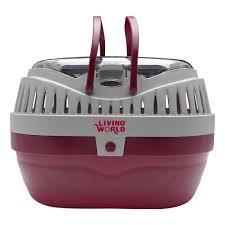This article about guinea pigs we will cover below
- Guinea pigs as pets
- ideal Guinea pig set up and cage, indoor vs outdoor
- best cavy substrate/bedding to use and where.
- Environmental enrichment with hides, and chew toys.
- Diet, what hay is best, what to feed, treats and what not to feed.
- Grooming.
- Mineral and vitamin supplements.
- Parasite control
- Hygiene
- Set up check list
- Training
- Health issues

Guinea Pig Breeder Sydney
Prices can range from as low as $10 each and sometimes even cheaper with specials. Prices may vary depending on breed, age and re homers. Consider re homing a guinea pig, you won’t change the world, but you will change the world for that guinea pig.
Our baby guinea pigs we sell are usually ages around 6 weeks of age. Our store often have package deals that are very worthwhile to save you money.
Visit our Facebook and Instagram page for updated photos and what we currently have in stock. https://www.facebook.com/BirdsvilleRosebery/
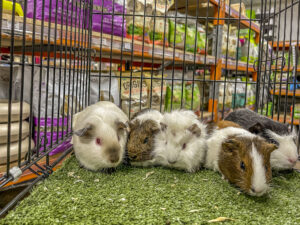
Guinea pigs for sale also known as cavies are highly social animal. As a species love to talk to you in happy squeaks when you enter a room. They are great with kids as they rarely bite. It’s recommended to get two of the same sex. Guinea pigs make a great choice for a family with limited space. Both male and female guinea pigs make great pets. When raised up together you can keep two boys together or two girls together. Guinea pigs can live approximately 3 to 5 years. Guinea pigs do not require any kind of vaccination. De-sexing is something you can consider, especially if you have a male and a female. You may wish to house opposite sexes together, there is less complications de-sexing the male over the female. Please talk to your vet about de-sexing. No such thing as a low maintenance animal and just like any pet they do require special care to make sure they are happy and healthy.
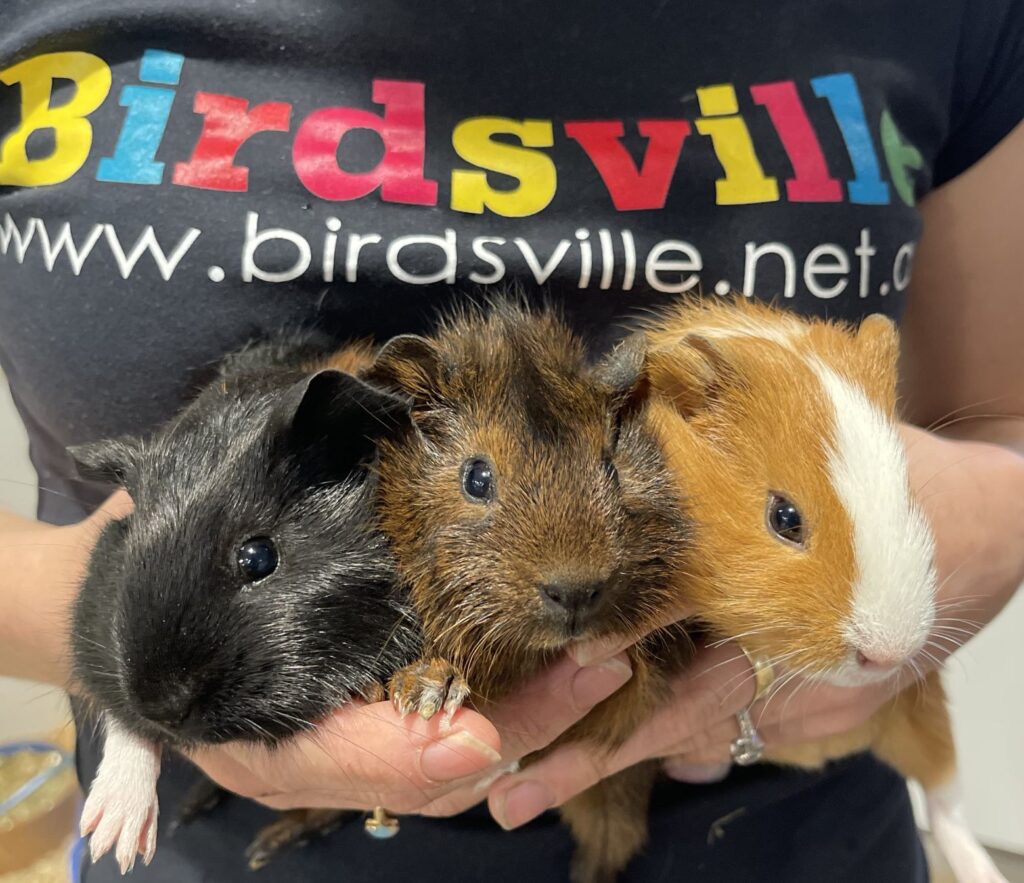
Guinea pigs grow 25 – 30 cm long and weigh 0.75 to 1kg.
To ensure the genetic diversity our Guinea pigs are only bred with one unrelated male at a time. This was made possible by our private breeder and Petsville sourcing new bloodlines to produce a high genetic diversity in our guinea pigs with many different patterns and colors. Never inbreeding our guinea pigs to produce the highest genetic diversity possible to create stunning pattern a good natured robust animal. Our guinea pigs because of this will sometimes have a slightly longer snout and more muscular lean body and interestingly more upright ears. We also do stock show line guinea pigs from time to time.
Our guinea pigs are sprayed with mite and mange spray and wormed but it is recommended to do this process again 10 days after taking them home.
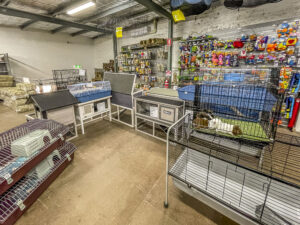
Diet of Guinea pigs
Diet: Guinea pigs as Herbivores will graze up to eight hours a day and need a well-balanced plant-based diet, consisting mostly of 80% hay.
At Petsville we stock every type of hay and there is no right or wrong choice for Guinea pigs as they love variety.
Guinea pigs should be given a high-quality brand of pellets every day. With plenty of choice including Petsville RGP pellets, cavy origin, Guinea pig selective, Peckish Guinea pig pellets. We have chosen to stock these specific products because they are high quality and great value. Please make sure you don’t overfeed on pellets. Its best to avoid many commercial brands of Guinea pig food, as they are often unhealthy, overpriced and can contain harmful additives or waste foods.
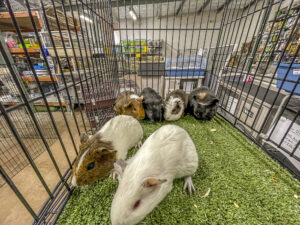
Minimum 10% of treats (including fruit and veg) … A list of leafy greens and fruits that should be includes, carrot tops, celery, Bok choy, broccoli, Brussel sprouts, spinach leaves, endive, Asian greens, parsley, dandelion, coriander, mint, basil, dill, carrots’ apples, watermelons, blue berries, strawberries, pears, capsicum….
Fruits, herbs and vegetables for guinea pigs
Include broccoli, mustard greens, apple, pear, Brussel sprouts, carrots, dandelion leaves, mint, dill, parsley, cabbage, spinach, beetroot leaves, wheatgrass and pea pods.
Legumes such as Lucerne, alfalfa or clover is not hay but are a great addition to your guinea pigs’ diet and yes Petsville have these in stock. These are much higher is vitamins and should be added to the diet.
Do not feed the following to your Guinea pigs- lettuce, cereal, avocado, onion, garlic, sugar, corn, beans, breads, sweets, chocolate, biscuits, grains, nuts and some garden plants can be toxic to rabbits.
Hay for guinea pigs
is an essential part of your Guinea pigs’ diet this should be available to them at all times. Our Petsville store only stock the best quality hay and we rely on turn over, so our prices are some of the lowest in Australia. 80% minimum of their diet is hay as it is essential for their digestive system.
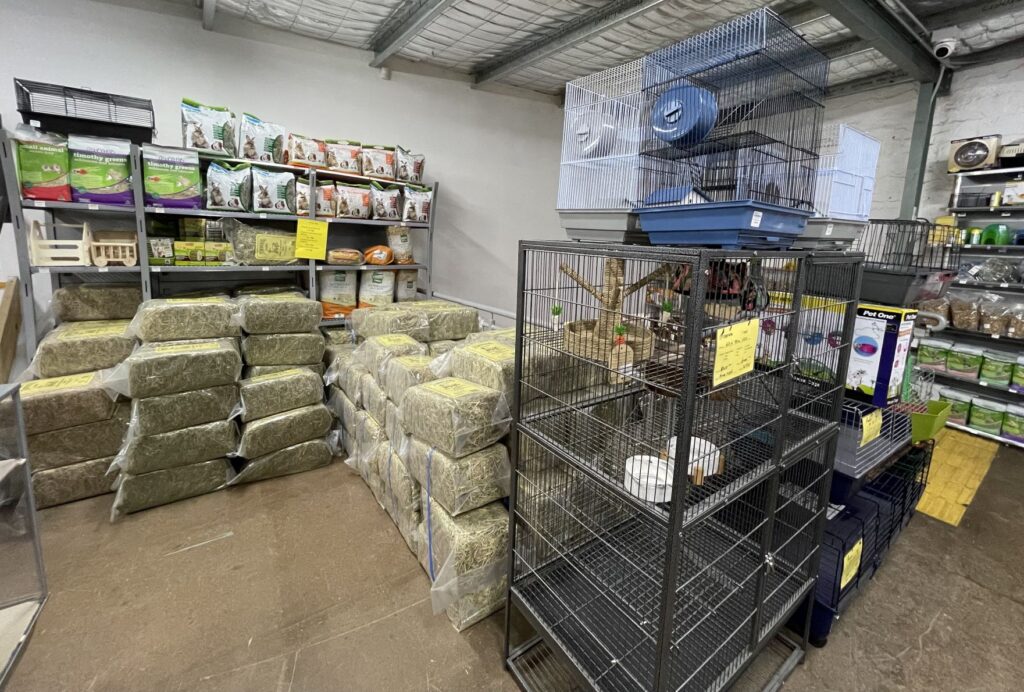
Our recommended hay is Rhy grass, Oaten, Timothy Hay and we also stock many blends with all the above. The most popular hay we sell is oaten hay. Don’t get caught up on all the marketing hype and expensive imported hay from USA etc. as we have the best quality produce in the world right here in Australia for a fraction of the price. We do stock imported and local hay, but always recommend Australian grown. Just because a food item is more expensive doesn’t mean that it is better. Many imported hays at high cost are fumigated through customs and sprayed with molasses to make it more palatable for the animal to eat. Imported hay must be fumigated/gamma rayed because of the risk insects coming in and affecting Australia’s agricultural sector. The biggest plus in buying Australian is cheaper and supports our farmers. Our team at Petsville / Birdsville always try to source Australian products first.
Never use old hay or hay from a source you do not trust. We have such a high turnover of hay that our customers never have to worry about old hay in store.
Do not confuse straw with hay, Guinea pigs can’t live on straw as it has no nutritional content, straw is only bedding.
Guinea pig pellets
Pellets should be 30% of the diet, Guinea pig pellets has essential vitamin and minerals that cannot be found in hay. Recommended pellets are selective Guinea pig pellets, Vetafarm Cavy origin, Peckish and Beaphar Cavy
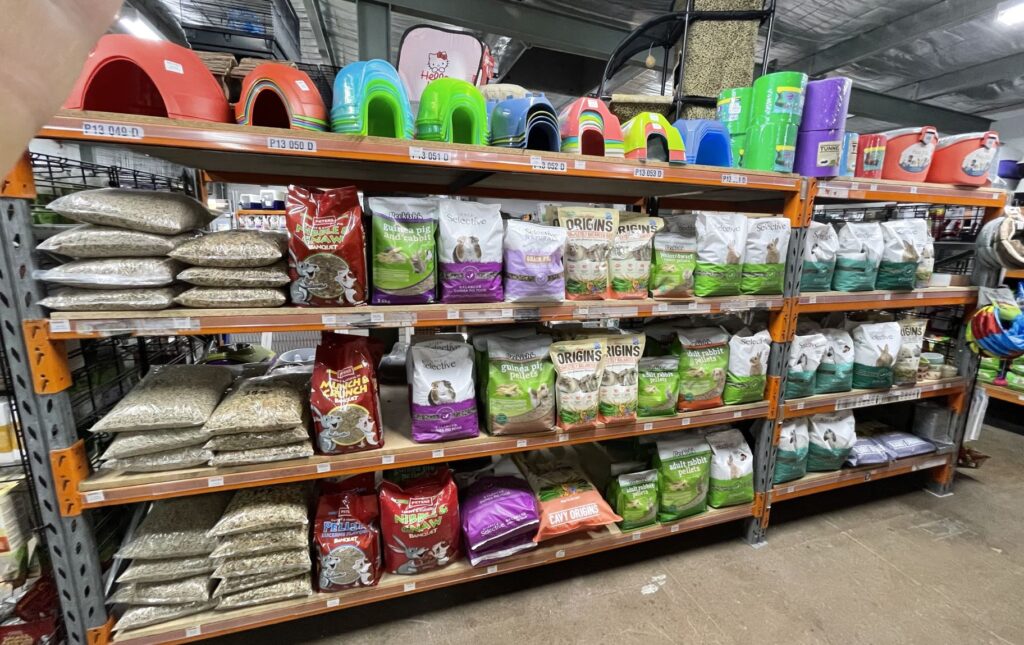
peckish Guinea pellets, and Birdsville Guinea pig pellets. Many large supermarket brands despite fancy packaging are often low grade and do not contain the daily requirements for optimum health. If you are feeding a low-grade diet, we would recommend supplementing the diet with vitamins available, we always have this in stock, come in and see us.
Interesting fact Guinea pigs and humans are the only animals that are unable to make their own vitamin C. Without this they will get health issues, so it is important to give them the correct pellets with fruits and vegetables.
Vitamin Supplements for Guinea pigs
To add that extra bit of health and vitality, Petsville stock small animal vitamin supplements drop that contain concentrated multivitamin, vitamin c and iron source. These supplements keep up their vitamin and mineral levels. Guinea pigs must have vitamin C in their diet, some guinea pig specific pellets will have added vitamin C, but others do not and will need to be add into the water.
Salt licks, mineral for guinea pigs
Important for health and wellbeing, your Piggy will need this depending on the diet. The fact of knowing you’re your Guinea Pig needs salt will be unknown as some quality produce and good diets simply lack a high enough salt content, depending on where the hay/produce is grown. Salt and minerals are necessary for a Piggy’s diet, but it must be consumed in moderation which luckily your Piggy will instinctively know when its body needs additional salt. A salt lick is important as it will aid in digestion, muscles, nerves and fluid regulation.
Guinea pig substrate and bedding
In an outdoor hutch base for your enclosure, straw is best but indoor enclosures straw or dust extracted sawdust, hemp or Kayte bedding are all very good options. Bedding depth can be around 5 to 15 cm, the ticker the bedding the less often it needs to be changed.
Bedding, we have many options for animal bedding for guinea pigs, Value for money, the best for indoor guinea pigs is dust extracted wood shavings, or litter,
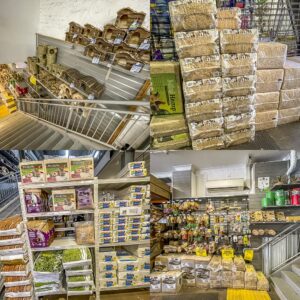
we also stock hemp, kaytee small animal bedding etc. For outdoor guineapigs in a hutch and you have a garden then your best option in straw. Our straw is very popular because it can be composted, and guinea pig manure mixed with straw is brilliant for making plants grow.
Guinea pig indoor enclosures and hutches
General rule of thumb there is no such thing as a cage that is too small, we have a huge selection of indoor and outdoor enclosures for guinea pigs. Indoor enclosures should be easy to clean with the wire top being able to be easily unclip.
Enclosure set up: Guinea pigs need a certain amount of space to move around, the minimum recommended size of enclosure approximately should be 80cm x 46cm 45H you will want a hay feeder that you will feed unlimited hay through, you will also need a drink bottle or bowl, we recommend bottles as bowls can tip over or the animal can step or lie down in it on a hot day and you could possibly lose your Piggy to dehydration if they run out of water.
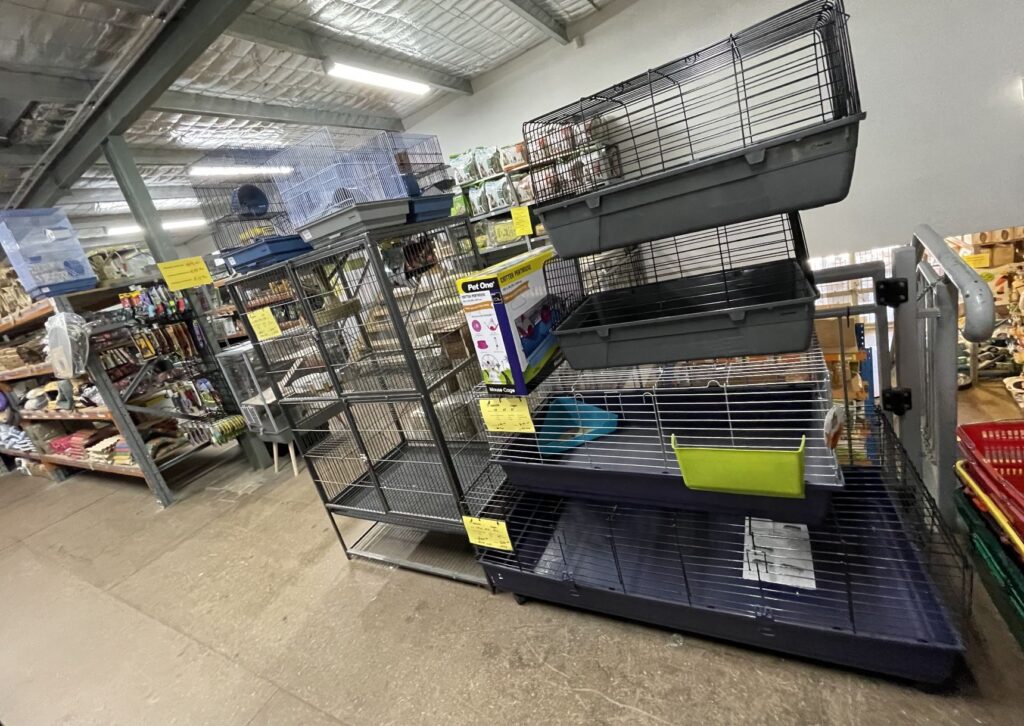
You will need a bowl on the ground for pellet, a hide in the enclosure for them to feel safe as they like enclosed areas. Guinea pig toys and chews are essential to keep the teeth warn down and yes Guinea pigs love to play with them. Attach a saltlick to the side. Outside adventures are loved by guinea pigs. A play area we recommend is our puppy/guinea pig play pens for an exercise area outside the enclosure.
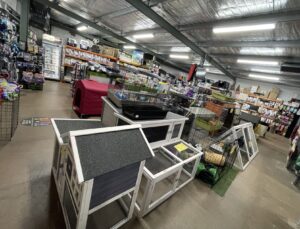
Guinea pig toys
Environmental enrichment (toys) keeps your guinea pig entertained while you are away and while they are in their enclosure. It also helps prevent behavioral issue down the track, such as chewing and boredom. It will help creates a tamer, friendlier and happier guinea pig. Toys can be rotated regularly so guinea pig doesn’t get bored and if the guinea pig destroys the toy, it means they like it and should be replaced.
Toys are essential, Guinea pigs love to play with and chew toys, hanging toys, ball toys. We have such a large part of our store designated for Guinea pigs for a reason, Guinea pigs just want to have fun. Toys also help to keep their teeth trim, which is very important, without toys it’s a matter of time before the teeth over grow and result in very expensive vet bills. Barbering is a problem associated with boredom in which a guinea pig chews its own hair or the hair of its cage mate, this happens when they are bored, and toys will re direct the guinea pig’s attention into the toys instead.
Teeth Health in guinea pigs
Guinea Pigs teeth will constantly grow throughout their lives, so having hard wooden toys are very important to wear their teeth down. Overgrown teeth in guinea pigs are not only extremely painful for them and become an expensive vet bill as vet treatment is the only solution. Guinea pigs need toys to chew and the proper high fiber diet and chew toys to stop their teeth from over growing in the first place.
Guinea pig Grooming
Long haired guinea pigs need their coats brushed to stop their coats from getting tangled, some long haired guinea pigs with a coat draping all around with need careful regular combing. whilst short haired guinea pigs need a lot less grooming. Guinea pig nails also need attention, usually every 5 months Birdsville \ Petsville have a selection of nail clippers, or you may visit us in store as we have a guinea pig nail trimming service for those who are not confident in doing it themselves. Clipping guinea pig nails like any animal is a skill as you need to be careful not to clip them too closely as it may cut the blood vessel. If this happens you will need styptic powder to stop the bleeding. Styptic powder is also available at Petsville\Birdsville.
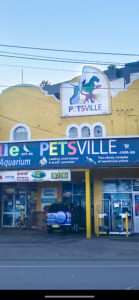
Click link for details on
Worming Guinea Pigs
Your Baby Guinea pig should be wormed 10 days after bringing them home. An adult guinea pig you can worm straight away even if it has already been wormed just to be safe. Guinea pigs should be wormed 4 times a year. Baby Guinea pigs should not be wormed until they have settled into the new environment (after the first 10 days), by this time they are the right age and settled in to be wormed. Worming a Piggy too young or to soon after being moved to a new environment can upset the stomach. The fact is the common house fly is known to spread a large number of parasitic worms, this happens when the infected fly that has left a pigeon poo or any poo for that matter then flies through the window and lands on your piggy’s water, food bowl or on your Piggy and infects them. This is the reason Piggy’s are regularly wormed. Humans and other pets can get the same worms. worming your guinea pig not only protects them but also the whole family. Worming your Guinea pig is easy to do as it’s a solution that goes into your Guinea pigs drinking water, a worming bottle comes with easy-to-use instructions on the label.
Mite, Mange & Flea and Guinea Pigs
Guinea Pigs are very susceptible to mites & mange. Spraying your animal with lice & mange spray every 12 weeks as a preventative, as it can be easily transmitted, even if you do not have any other pets. Guinea Pigs can sometimes contract fleas, if this happens come into see us for a shampoo specific for your guinea pig, as other shampoos can harm their sensitive skin. Lice and mange are also spread by the common house fly. Lice and mite spray is simply sprayed evenly on the animal avoiding the eyes, the bottle has easy to use instructions on the label.
Handling Guinea pigs
While handling Guinea pigs always support the bum and hold with 2 hands. When you first bring your Piggy home, it is a stressful period for them. Give them a day or two to get use to their new environment. When your Piggy has started to eat and drink, you can start to handle him. Gently handle regularly, in short intervals, giving the plenty time to rest. Guinea pigs can Jump and it’s important that they are not dropped as this could cause severe injury or death. Guinea pigs in a new home will likely be a bit standoff Ish, so it’s important to do plenty of gentle handling to get them used to you and your scent.
Guinea pig Hygiene
Because Guinea pigs live in such close contact with their litter and bedding these must be kept clean and free from toxins. Cleaning your Piggy’s cage regularly, with the right cage clean is essential to avoiding unnecessary health problems. Ammonia in the fumes of urine causes irritation in the nasal passage which makes them more susceptible to infection. The deeper you make the bedding the longer you can go between cleans. If your cage gets stinky you have left it too long.
General care and grooming Guinea pigs
Brushing can be done to remove dead hair; long haired guinea pigs will need regular brushing. You may want to give your Guinea pig a bath from time to time, make sure you only bath them with rabbit safe shampoo that has the correct PH, as human, dog and cat shampoo can harm their sensitive skin.
Everything you will need to own a guinea pig.
Full set up
Carry Cage – Every Guinea pig owner needs one for safe animal transport.
Enclosure/Hutch – Please consult staff on minimum enclosure requirements. Both indoor and outdoor enclosure are available.
Guinea Pig Pellets Quality – Petsville premium RGP PELLETS, Selective, Peckish, Cavy Origins.
Hay – Oaten, Ryegrass, Lucerne, Alfalfa, Timothy, Pasture or Ryegrass. This makes up 80% of their total diet. It is an important source of fiber assisting in digestion.
Salt Lick / Mineral Block –– Provides essential salts and minerals including calcium to assist with healthy teeth, digestion and healthy bones.
Treats – Great for training and rewarding your pet. Makes up 5% of their diet.
Hay Feeder – – Important so you can feed hay that hasn’t been soiled.
Drink bottles – Important as these can’t poo in it or be tipped over during the day.
Bowls – Suitable and heavy that won’t be knocked over.
Toys – Minimum 4 – 6 appropriate toys for chewing and playing.
Tent/ Hide – Small safe place for your guinea pig to hide. Can range from tents, pouches, and hides which come in a variety of materials and sizes. When choosing one, keep in mind how big your guinea pig will grow too.
Substrate – Straw, sawdust, paper litter, mini hemp, wood litter or Kaytee litter. Do not use hay (food) for substrate as it could lead to sickness.
Hutch Cleaner – CSI, Vetafarm, F10 and Aristopet are all guinea pig safe, nontoxic disinfectant and makes it easier to remove poo and dirt from hutch, toys, and bowl. Normal disinfects can be quite toxic to guinea pigs.
Wormer – Recommended to worm 1 week after bringing home and repeated every 3 months to prevent internal parasites.
Lice & Mange Spray – Recommended to use 2 weeks after bringing your bird home and repeated every 3 months to prevent external parasites.
What to consider:
Feeding / Accessories – Spare treats and bowls for food and water.
Toilet – Toilet training may be an option. An appropriate size litter tray and wood or paper litter is needed. Substrate in litter tray should be different from substrate used in the enclosure.
Vitamins – Small Animal Vitamins & Vetafarm Vitamin C, if not already in pellets.
shampoo or dry bath– To keep them clean we recommend occasionally giving them the occasional clean. We stock guinea pig shampoo & guinea pig dry bath.
Bed – For the luxurious Piggie who love comfort.
Tunnels – Great for piggies to run through and play.
Play Pen – It allows an extra safe place outside their enclosure for indoor and outdoor use.
Synbiotic / Probiotic – can boost immune system, support digestive function when use daily.
First aid – Spark, Triple C, F10 barrier ointment and heat lights are a few things that can be kept on hand in case of an emergency.
Harness – Recommended if you want to take your guinea pig on outside adventures.
Training Guinea pigs
Understanding Sight, touch and smell is essential before training.
Understanding the right approach you can train them quite easily, sadly many people fail to train them because they have adopted the wrong approach and do not understand the nature of Piggy’s. Firstly, you need to understand how a Piggy view and smells the world. As a prey guinea pigs have eyes on the side of their head, this is because they are a prey animal. Guinea pigs have very poor eyesight looking ahead straight, but this type of vision is perfect for a Piggy as they can always see almost 360 degrees. As a prey animal, they need to be able to run and hide from a predator approaching from any direction. A Piggy’s sense of smell and whiskers are used to detect anything in its immediate environment more so than sight, although they will learn to use sight as they get older to identify people and treats.
Before touching or patting your Piggy you need to calmly let them see and smell you, this will greatly improve your bonding allowing your Piggy to be calm as this will verify that you are a friend and not a predator.
Once you have been verified, give your Piggy a treat and give plenty of kisses and cuddles as they love affection once they feel safe.
Devoting a little time every day to training your Piggy will get best results, 2 sessions a day of at least 2 minutes training your Pig to follow using your Piggy’s favorite treats. Petsville have a huge selection of guinea pig treats. When called for example give the Piggy a reward every time, they come to you. Always make sure you give your Piggy a treat immediately when he has performed what was asked.
Harness training Guinea pigs
– First thing you will need is a proper harness specifically for guinea pigs, Petsville have a number of good quality guinea pig harnesses and leash’s arriving regularly. Never use a collar on a guinea pig. Start by getting your guinea pig used to wearing the harness and leash inside to begin with for a few minutes at a time to get used to it, then you can start leaving it on for longer, then start using the leash indoors. Never rush your guinea pig and have realistic expectations, don’t make the walks too long or daily just the occasional excursion to a nice grassy area when they are used to the leash and harness.
Health issues or changes in your Guinea pig:
If you ever notice a change in behavior/appearance, off their food, quiet, lethargic, wheezing, runny nose, runny eyes, drooling, skinny.
Loneliness: Guinea pigs can die of loneliness as they are highly social. If you have guinea pigs that doesn’t like to be touched because it wasn’t socialized properly, they still will love out of the cage time and space to exercise. Also provide them with plenty of toys to entertain themselves. They should always be kept in at least pairs.
Bumblefoot: Sores on the bottom of a guinea pigs’ feet common in pigs kept in a cage with a wire bottom, some bedding or straw is always recommended at the base.
Fly Strike: not so common in Australia but usually affected by outdoor Guinea pigs. A condition where flies bite the Piggy the rump becomes uncomfortable and itchy, the fly’s also lay maggots inside the wound, this can be prevented as petsville stock a product to get rid of fly’s that is animal safe or bringing your pet inside.
Overgrown teeth or claws: If you follow our guide on diet and toys its very unlikely you will have issues with teeth Our petsville team can check your Guinea pigs’ teeth and claws if you ask us. We offer a Guinea pig nail clipping service 7 days a week in our petsville store. Teeth correction must be done by a vet, Overgrown or crooked teeth can be cause by trauma, poor diet or a lack of items and toys for your Guinea pig to chew on.
Coat dandruff or fur loss: a sign your Guinea Pig has mites or less commonly fleas. A lack of vitamin C ‘scurvy’ A regular mite and lice treatment or vitamin C added to diet will prevent this mentioned above. This also could be a mite infestation.
Weight loss: Could be caused by the above overgrown teeth or a whole host of reasons including cancer, neurological disease, virus, bacteria, starvation, trauma, stomach ulcers, injury, kidney failure, tumors, dental disease, poisoning, respiratory disease to name a few.
Diarrhea: Guinea pigs have a sensitive gastrointestinal tract that have specific natural populations of bacteria in the gut for normal bowel function. If this bacterium becomes altered or unbalanced ‘bad’ often gas producing bacteria can over grow, producing gas, slow down digestion and food passage through the digestion tract, release toxins and cause diarrhea, other issues that can cause diarrhea are Antibiotics, coccidia, cryptosporidium.
Sudden Death Syndrome – Small animals are more susceptible to sudden death syndrome. There are many reasons why this can happen including but not limited to fright, being spooked, heart attack, stroke, nightmare or nightfright. Often when an animal that has passed of sudden death a full necropsy report from a vet will come back showing no reason as to why the animal has passed. Sudden death can occur with any animal especially small ones. Unfortunately, one cannot guarantee life of any creature tomorrow as it is a living being and not a toaster. By following this full page, you have the best chance possible in keeping your pet happy and healthy.
Health check: is a great skill set for any Guinea pig owner to have and can increase your ability in spotting if your Bunny is not 100 %. A Guinea Pig visual health check starts with a pat from the head to tail, if you feel ribs and bones then the Guinea pig is skinny and that is a big red flag, also check your Guinea pigs’ eyes, nose and mouth, there should be no discharge or mucus coming out of any of them.
We do stock some basic medications, but we are not vets but have been dealing with Guinea pigs for a long time and are our team members are skilled in doing visual health checks. Our team is happy to teach anyone for free how to visually health checks their guinea pig, we don’t mind if you didn’t get the guinea pig from us, it’s just a great skill to have so you can notice if there is an issue and act appropriately. Antibiotics should only be prescribed by a vet for guinea pigs. We also have a list of vets listed at the bottom of this page as they can do a whole series of tests to pick up something for a Guinea pig that is asymptomatic.
Please be aware these animals are not DNA sexed. Whilst we may give an opinion on sex and we are very accurate and happy to show you how we sex them, this is not a guarantee, as young guinea pigs can be hard to sex.
Guinea pig Boarding is available throughout the year, please go to petsvillehotel.com for all bookings.
Do not hesitate to come and see us in store if you have any concerns, or question and bring you guinea pig for us to see.
Are you ready to be a Guinea Pig Guardian? Please all new Guinea Pig owners read all the below, we have detailed all the important non-sugar-coated facts of Piggy ownership. Please follow these details below as occasionally people find different opinions online and sadly the Guinea pig can pay the ultimate price for poor information. Our goal for our customers’ pets is to thrive physically and mentally. This is how we and our breeders keep our birds happy and healthy.
Recommended Vets
Small Animal Specialist
Hospital 02 (9190 6806)
Level 1 1 Richardson place North Ryde
1300 9453 838
22A Bridge Road, Glebe
02 9436 4884
57-63 Herbert St Artarmon
02 9516 0234
60 Princes Hwy, St Peters
02 9871 6036
772 Pennant Hills Road Carlingford
995 Bourke Street waterloo Sydney NSW 2017

